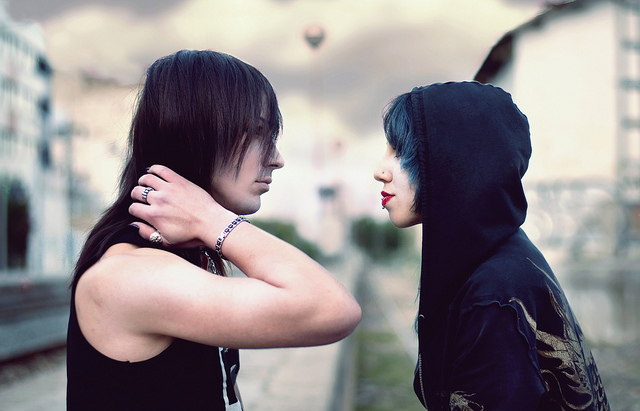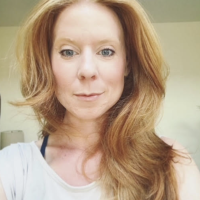
*Eleditor’s note: Astrology isn’t a religion. We’re not sure it’s a science, either. It’s magic, maybe. But, as with feng shui, say, things affect things. So as long as we don’t go blaming our problems on the stars, as long as we assume responsibility for our own actions…well, hell, a little auspicious coincidence and applicable wisdom can’t hurt. And so, with that grain of salt…enjoy!
~
You may believe that relationships are a mirror, you may have even used others as a reflection for change and healing.
But what do your relationships really say about your deeper needs? The parts of you that long to be healed, touched, awakened and transformed?
From a Jyotish perspective, the 7th house of your birth chart represents relationships. It show us the other, seeing outside of yourself. You may like what you see, or you may despise it. Depending on the planets and their relationship with your 7th house, you may experience more or less challenges with the other. There may be cycles that kick up extra turmoil or pain as a result of the mirrors you are looking at.
These external mirrors are reflecting to you what is inside.
Whether it feels good or hurts, what you are experiencing is a piece of your inner landscape. Love or hate, it’s all within you.
The 7th house of the Jyotish chart is an expression of yoga. Of merging, integrating and uniting all the parts of ourselves that we feel separate from, the parts outside of ourselves. The house of relationships reminds us how to conjoin and connect, to harmonize and balance our inside world with our outer world.
The problem is that most people don’t use relationships as a resource for deep inner healing. Most people are using relationships as another resource for avoidance, resistance or addiction. Relationships become a passive resource for connection, rather than one of deep transformation.
Yoga is union. Yoga is life. Relationships are yet another resource for yoga.
Yoga is not just a merging of the self with the divine. Yoga in fact is union on all levels of our being—union of the human self and the spiritual self. Only when these two bodies begin to dance together with more integration, we will find harmony or unity. Our humanness must learn how to co-create, to be in relationship with and to integrate with our spirit—then yoga is achieved. This dance of integration is in constant fluctuation and change, yet always seeking balance.
It’s not easy to work with the hard stuff, the darkness—our human qualities—and to use the pain as a resource for transformation. Very few people are able to do the powerful inner work needed to become enlightened while staying in isolation. The mirrors coming to us from relationships are catalysts for deepening our awakening process. They arrive to help us lean in closer. To awaken new pathways within.
When a relationship feels good, it can be a welcome resource to ease and support, to nourish and soothe.
But what about difficult relationships? How can we use these painful experiences to deepen and awaken ourselves from unconscious slumber?
When a painful or challenging mirror is shown to us, it is a reminder to look closer at ourselves. It has arrived to flash a part of our being to us—a part of ourselves that we need to look at acutely. No one wants to admit they have a mean, horrid or deceitful person hidden inside of them. But if we can work with this shadow more consciously, we will be liberated from it.
How willing are you to look into the mirror of your relationships and use the despised, painful parts of yourself as your biggest teachers?
How willing are you to use these outside mirrors, the people that you hate, as your biggest guru?
In reality, when these mirrors arrive, they are in fact the parts of ourselves that we refuse to look at.
They have to intensify and show up in our face, blatantly screaming, just to get our attention. The longer we repress, suppress and avoid the shadow, the more intense and obnoxious it becomes.
If we attract a sad and lonely person, this requires us to heal the grief within.
If a narcissist appears, we must attend to our inner narcissist.
If a whiny, complainer arrives, we must attend to the dissatisfied parts of ourselves.
If an angry, violent person is presented to us, this enraged person becomes our resource for healing our inner violence.
Everything that we attract is a resource for our healing work. Every mirror is a reflection of our inner being. This includes our family system and the story of our lineage. Often these parts of ourselves can be suppressed, resisted or avoided for generations, but eventually they will emerge stronger and darker than ever. Eventually there will be a potent expression of the pain, grief, shadow and darkness that has been hidden in the family for generations. These mirrors are resources for healing not only ourselves, but the darkness and grief that has been suppressed in our family for generations.
When a challenging or painful mirror arrives, do you look closer?
Do you lean in or do you push it away? Do you walk past it or do you recognize the mirror being shown to you?
When a painful mirror arrives, remember that it is a resource. We have choice and freewill that can determine the outcome.
Just to be clear, using the pain as resource for our healing never requires staying in a dysfunctional or abusive relationship.
How we choose to use the challenges will determine the awakening that takes place within. This includes using healthy boundaries. When the same mirror returns over and over, it is vital that we deepen our inner work and recognize that we are resisting some shadows, parts of ourselves that are still hidden.
A relationship with another person, is a concentrated relationship with ourselves. This is yoga in action. This integration with self and other, with human and spirit, with light and dark, is the path of yoga.
The 7th house of the Jyotish chart reiterates this expression of yoga, reminding us that everything that arrives on our path is a resource for awakening, transformation and healing.
Relephant:
Author: Saraswati J.
Image: flickr/Draigona Vampire
Editor: Ashleigh Hitchcock; Nicole Cameron

 Share on bsky
Share on bsky




Read 1 comment and reply